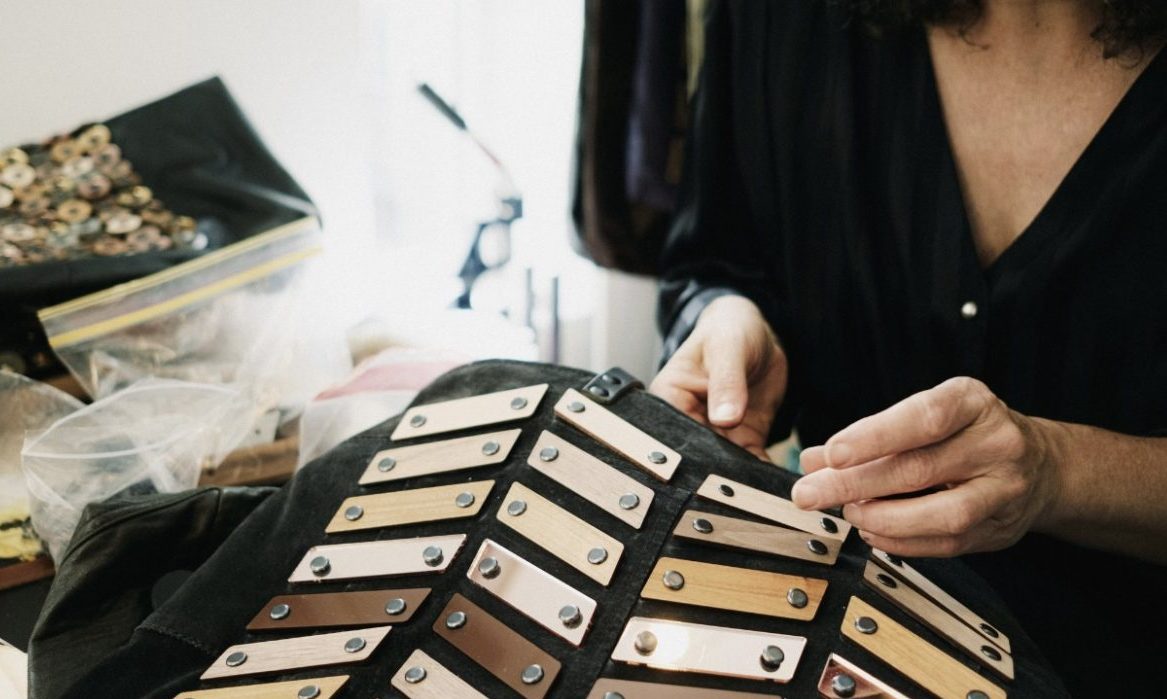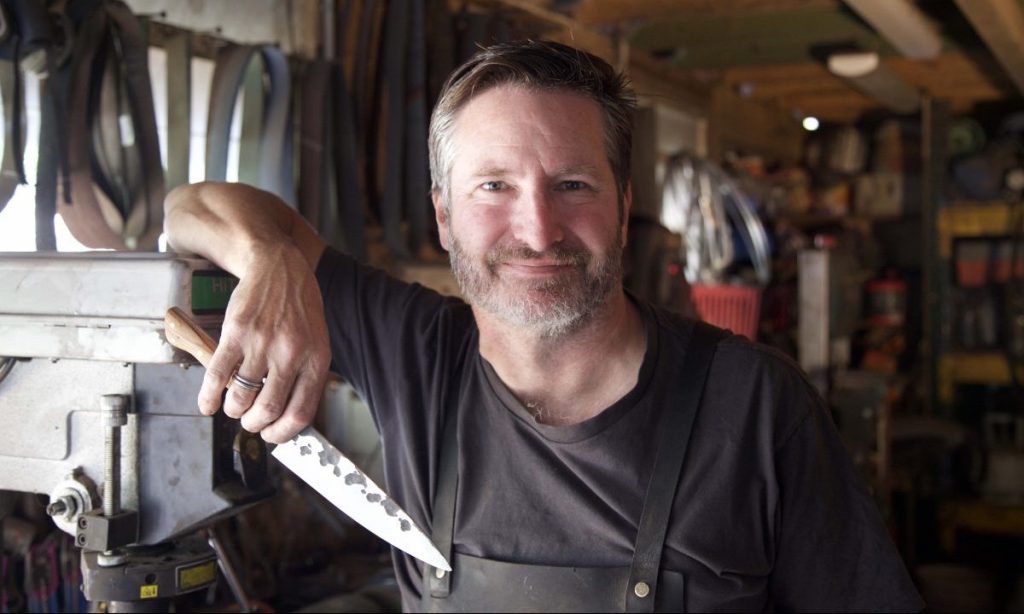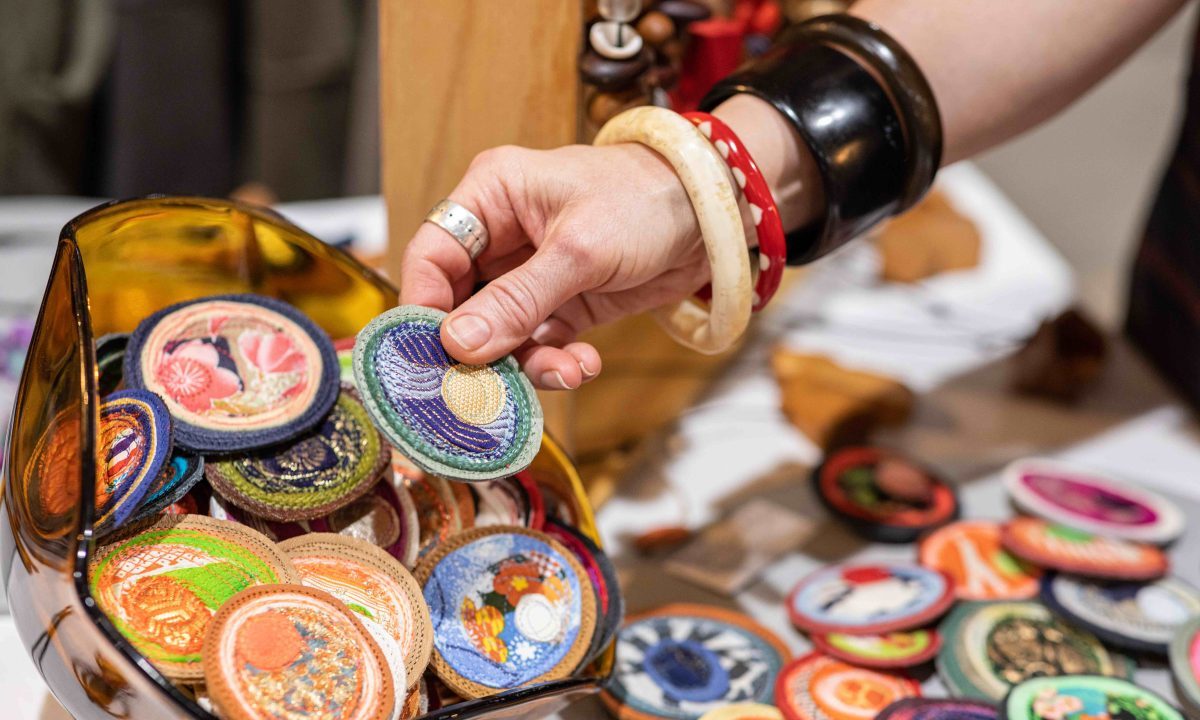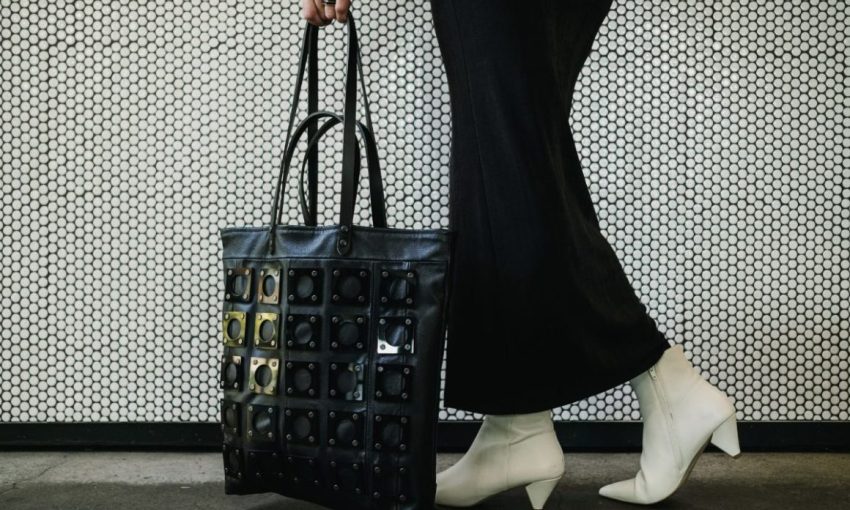If the quest to reduce your environmental impact sees you going without rather than buying new, these stallholders at Bowerbird just might soothe your style cravings and your conscience.
Shop happy at Bowerbird with these picks from the circular economy
For more than a decade Bowerbird has satisfied Adelaide’s hunger for quality, one-off, hand-made and creative designs.
As more of us make a conscious choice to reduce our environmental footprint, makers are also joining the circular economy, by up-cycling and recycling materials and eliminating manufacturing waste.
Here we introduce you to three talented, ethical, Adelaide-based makers that you can meet at Bowerbird in May.
Discover a range of talented local and interstate makers at Bowerbird, happening 5–7 May at the Adelaide Showground.
Metanoia

Maker Tina Mavromatis adding the finishing touches to a Metanoia bag
Metanoia reimagines vintage leather jackets into timeless, handcrafted bags embellished with laser-cut metal, acrylic and timber offcuts.
The label’s founder and maker, Tina Mavromatis, found slow fashion while pregnant and reading about the impact of the fashion industry. At the time, the Adelaide native was in Sydney, making and selling her own leather handbags and other items.
“Reading it just totally turned me off ever buying leather again,” Tina explains. “I realised immediately that I had to start sourcing my raw materials from elsewhere.”
Moving to Victoria, she took a break while her children were young. Then, during that state’s COVID lockdown, she embraced the opportunity to think deeply about reconfiguring her business model and redesign her products.
“I wanted to move into slow fashion [and] up-cycle and source my raw materials through charity,” says Tina, who has been back in her hometown of Adelaide since 2021. “I got a little bit anti-capitalism and anti-corporate world.”
Tina lining her bags with business shirts she sources from op shops can be read as slightly ironic, then.
She also uses industrial waste from local manufacturer RM Williams for the bag straps, and the embellishments are from signwriters’ offcuts.
Metanoia means ‘spiritual transformation’ in Greek, and reflects the granting the recycled jackets a new life. Working within the circular economy is important to Tina, as is buying raw materials exclusively from charity shops to support their revenue streams.
Tina says her bags have found a balance between “being a fashion product and being an ethical sustainable, circular economy product”.
“Basically, I have a zero-waste policy, I don’t throw anything out [except for] the very fine edges. I keep everything,” she says.
Smaller pieces are joined together to make useful expanses of leather, and Tina saves the linings from the deconstructed jackets.
“I’ve got bags of jacket lining. Because something will come to me that I can make from it!”
Connect with Metanoia on Facebook and Instagram.
Dog Boy Knives

If you are fortunate enough to dine at Restaurant Botanic, Gourmet Traveller’s 2022 Restaurant of the Year, you may use one of Dog Boy Knives’ hand-forged knives.
Founder Richard Cooper’s reputation as a knifemaker has seen him supply many of the hospitality industry’s best known names with steak, cheese and chef’s knives.
His blades are made from recycled carbon steel, a metal is known for its strength and ability to retain a sharp edge.
The recycling aspect of Dog Boy, however, was incidental to Richard.
“Originally, it was due to availability, to source of the kind of steel that I needed to make knives,” Richard says. “I started making knives using old files and leaf springs, the kind of stuff you can find in second-hand stores.”
Some of the materials in his knives have provenance and carry their own stories: timber from a friend who pulled up the floorboards of their house, wine barrels now retired, the tree that fell down at his sister’s house.
But he also obtains timber scraps from furniture makers and boards from salvage yards. Meanwhile, old sawmill blades, such as those given to him by a fellow knifemaker, are an excellent source of high-carbon steel.
“There’s not always a history behind it, but sometimes there is,” Richard says.
“I think most of my customers quite like the idea that it’s recycled. It’s a point of difference.”
For his Damascus knives, Richard can only use new carbon steel alloys – the dozens of layers forged together produce the distinctive yet unique patterns on the blades.
He says it makes knifemaking to an artform.
“Some people think it has magical properties, but it’s just more for the aesthetics,” he says.
Read our profile on Dog Boy Knives from 2018 and connect with the business on Instagram and Facebook.
Mainichi

Dearne Mills has been making her up-cycled jewellery pieces since a trip to Japan in 2004, when she returned with armloads of vintage kimonos and beads.
“I haven’t studied fine jewellery making, but I am a maker,” says Dearne, who is an interior designer at local architecture studio Tectvs and makes jewellery on the side.
“Mainichi (Japanese for ‘every day’) reflects the fact that it’s not jewellery made from precious stones and metals… It’s made from everyday materials that you don’t normally associate with something precious.”
Deane creates pieces using leather upholstery offcuts, vintage Japanese fabrics, children’s counting rods and seeds. The machine stitching on some Mainichi brooches is reminiscent of the circular gravel patterns of Zen gardens and origami folds.
Sue Fenwick at Adelaide Remakery (who will be hosting a workshop at Bowerbird) puts aside haberdashery and other items that she thinks might be useful for Dearne. A recent haul includes a bag of imperfect resin moulded pieces, found by the side of the road, that Dearne plans to cut, polish and make into beads.
While the impetus behind Mainichi is for Dearne to live a greener life, Mainichi’s pieces are affordable, eye-catching and playful.
“The way I use materials and combine things – people are quite fascinated by that idea [of up-cycling],” Dearne says.
A few years ago in Melbourne, she exhibited a collection of jewellery entirely made from plastic food packaging, including the lids from cream bottles, fruit and vegetable netting bags and soy sauce fish.
“Environmental awareness is definitely a huge part of my work,” Dearne says.
“I’m not trying to preach a religion or convert people to being more environmentally sustainable. But it’s part of my ethos and always has been.”
Connect with Mainichi on Instagram.
Bowerbird design market will be held at the Adelaide Showgrounds from Friday, May 5 to Sunday, May 7. Purchase tickets and browse the market stallholders at the website.




